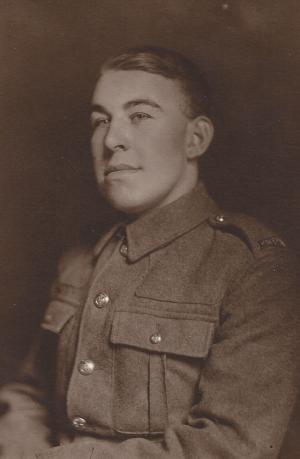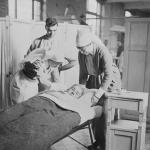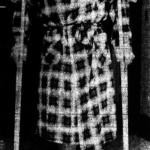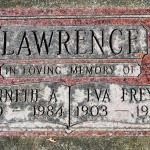BX December 7, 1918
In the report of casualties issued from Ottawa this morning, Kenneth Ashley Lawrence, Brantford is reported among the wounded.
BX November 11, 1937
Last Casualty’s Advice is to Stay Away From War – Canadian Wounded at Valenciennes at 10.57 a.m. November 11, 1918 – Is in Business Here
A few years ago there appeared in a Toronto publication a picture of a young soldier lying wounded in a casualty clearing station at Valenciennes, France, where nursing sisters were ministering to him. He was identified as Kenneth Ashley Lawrence, now a resident of Brantford, and the last Canadian wounded in the Great War. The picture had been taken for war records very shortly after the order “Cease Fire!” went down the line. Today, Mr. Lawrence conducts a flourishing confectionery business on Chestnut Avenue and counts many friends among his customers. This Armistice Day recalled many scenes and memories to him when he was visited by the Expositor.
“I am a sample of what war can do physically to a young man. There are thousands like me, and then there are thousands not physically but mentally and morally hurt. I wouldn't go again, I couldn't go again. War is no bed of roses. War is this…,” Mr. Lawrence indicated where his left leg was. It was amputated after he was wounded. A crutch takes its place.
It was 3 minutes to 11 on November 11, 1918, when the 18 year old Lawrence “got his” in the mud at Valenciennes. He is now 37 and despite his handicap carries on cheerfully and successfully with his small business.
Lawrence, strangely enough, is United States born. He is a native of the State of Michigan. He came to Brantford as a young boy.
No Pacifist
“I am no pacifist. I know there must be war, but I can’t escape the killings, the dirt, the lice, the horrors any soldier knows in the front line. This is not for my son or anyone else’s son. It is for no man,” Lawrence said.
“After they had raked the mud out of the wounds I picked up…after they amputated…and I was convalescing, I had much time to think. I am no philosopher, neither am I a college man, but it could not escape even me that this slaughter of men like cattle, the bombings, the terror of whistling shells was so unreasonable that it was unreal and inhuman. It was so terrific in the heat of action, it was happening and after it was over it was too late to remember everything.
“This Spanish and Chinese slaughter must be something like it. I wouldn't know. I am here now and the war is there. When I was there with the war, I knew. When you are there, that is the only time you can really know.”
Lawrence is a big, strong, virile man. He is as big as Charlie Conacher, Tommy Farr, “Bummer” Stirling, and, but for the war, he might have been like one of these. He leaned toward athletics just as he was breaking in his first long pants and if it had not been for the war madness that struck his generation he may have been a hockey player, a fighter (not with a gun) or a football player.
He has hands and arms made powerful from walking on crutches for 19 years. His hands grip like vises, his biceps are as big as a boxer’s and his is a ruggedly handsome blond man.
He has never “swung the lead” as a disabled soldier. Since he left the hospital he has gradually progressed, first learning the trade of watch repairing and then slowly leaving it to branch out into the business he now has. He drives his own car.
Thought He was “Stupid”
Mr. Lawrence was wounded because he was too bold. “Some people might call it brave, but I don’t think so,” he,” he said. “I think I was very stupid.”
With an enemy machine gun popping off at him, he tried to set up the machine gun he was carrying and retaliate.
He never got a chance to fire the gun. Before he got it up he weakened. He felt himself slipping but he couldn't help it. Before he passed out a thousand ‘ifs’ flashed across his mind. If he had been kept out of the line for another week, if he hadn't been so anxious to advance, if he hadn't been such a sap as to try to set up the gun before looking for a nice safe hole to lie in, he wouldn't have “got his.”
“It was ‘if’ then and ‘if’ after I got back to hospital,” Lawrence said. “If we had only waited a few minutes I would have been walking around now with two legs.”
While the shots were drilling into him, it wasn't so bad, he said. “It was just as though your foot had been asleep and was just coming out of it.” The pain came after.
When he was hit, Lawrence was with eight or ten others of a machine gun party of the 31st Battalion, an Alberta unit of the C.E.F., on the advance.
He had been with the battalion only a week, returning to the lines after recovering from the effects of being gassed.
An officer, while the German machine gun was still sputtering, pulled young Lawrence out of the mud. Lawrence would like to know who he was. While the officer was at his side, somebody else took the gun and Lawrence was picked up and carried back to a casualty clearing where he was photographed. The war was over then.
“I was carried a long way, I don’t know how far,” Lawrence said. “Two weeks later they amputated. To lose one of my legs was almost to lose my life.”
Just before he was shot, Mr. Lawrence said, he, with others of his party, had heard a rumor the war would be over at 11. The party was making “one last stab” on the advance, expecting no opposition immediately in front because scouts had reported there was nothing to be afraid of. The party was caught flat-footed when Jerry opened up.
Mr. Lawrence convalesced at Buxton, Derbyshire, and other places in England. He returned to Lawrence Station, in St. Thomas, Ontario, and later came to Brantford.
He enlisted with the Canadian Mounted Rifles at Hamilton, going from this city to Hamilton so that no one would recognize him and report his age. He was not yet 16.
His hands calloused by his crutches, palms up on the counter at his store, he said:
“Just look, hands as hard as the bottoms of your feet. My whole life laid out on a new pattern when I was barely 18. One leg, this is war. I would advise young men, and old men too, to stay away,” Lawrence declared.
But all this has made little difference in the personality of the man. He is a cheerful observer of life. A few hundred friends will vouch for the fact he is a most likable fellow to meet.
He is a member of the Amputations Association of the Great War, an organization with members across Canada who had their memories heartily jogged today.
BX November 11, 1972
By Ernest Middleton expositor staff writer
City man among last to be injured in the Great War
Fifty-four years ago today, at 11 a.m., an armistice was signed between the Allies and Germany, suspending hostilities of the First World War. To remember the dead of that war, The Second World War and the Korean conflict, we pause each year, on that date and at that time, to remember those who died. But the meaning of Remembrance Day is becoming more obscure as new generations emerge.
It happened shortly before 11 a.m. on November 11, 1918, but Kenneth Lawrence of Norwich Street doesn't like to remember it.
Minutes before the armistice was signed, Mr. Lawrence was hit in the lower abdomen by a machine gun bullet and his left leg was amputated at the hip soon after. Mr. Lawrence, an 18-year-old orphan, was the last man to be injured in the Great War and live.
"To me," said Mr. Lawrence on Friday from his hospital bed, where he has been for the past few days, "Remembrance Day is just another day. I lost my leg in vain and the war to end all wars was in vain."
"Immediate generations remembered those who died, but it means very little to today's generation. They are concerned with other wars."
Now 72, the infantryman who lost his parents when he was young, recalled he was 15 when he enlisted with the Hamilton Mounted Rifles. "I was too young to join," he said, "friends tried to dissuade me, but I had nothing better to do."
After brief basic training here, Mr. Lawrence found himself in Folkestone, England, just a few miles from the war front. "I missed some big battles," he said, "but I saw plenty of action at Amiens and a few other places."
Four years and many battles later, Mr. Lawrence was removed, blinded with mustard gas, from the front line at Cambrai. For two weeks he was in blindness, wondering if his sight would return, but never guessing what was in store.
"I was ready to be shipped out when news came of a last, big push came through," he recalled. "Anyone who could carry a rifle was given one and sent to the front."
Because of his strength, size and experience with the Lewis machine gun, Mr. Lawrence was given such a weapon.
"At 9 a.m., on November 11, 1918, we learned the armistice would be signed at 11 a.m.," he said. "But we were ordered to keep going right up to the last minute.
"We were near Mons when an officer sighted movement ahead," said Mr. Lawrence. "I was ordered to spray the area with my machine gun. I was flat on my stomach and could see the village of Mons in the distance."
"The next thing, a long-range machine gun opened up on us and I saw the spurts of earth from the bullets coming right at me. I was hit by one or several bullets that ricocheted under me," he said.
Mr. Lawrence didn't know at the time, an artery in his groin had been severed, cutting off the flow of blood to his left leg. It was three hours before he received first aid and 12 hours before he received hospital treatment.
But gangrene was to set in. Ten days later his leg was amputated below the knee; a few days later, it was severed at the hip.
"I was too young to realize what losing a leg would mean," he said.
Mr. Lawrence was in his glory for a short time while the press interviewed the last man to be injured in the war.
When he returned to Canada, he was met by a representative of the Salvation Army, but no one else. What was a young amputee to do? He asked himself.
"I took vocational training in watch repairs under the apprenticeship of a friend, Harold Gibbons."
In 1921 he married a Brantford girl, Eva Frey, and the couple had two children — a son and a daughter.
During the Second World War, Mr. Lawrence worked with the R.C.A.F in Ottawa on aircraft instrument repairs. He also worked with the U.S. Navy in Long Beach, Calif., on gun-sights.
He has now retired, enjoys fishing, but his eyes are failing.
This is the kind of man we should remember today.
BX November 12, 1984
LAWRENCE, Kenneth A. At the Brantford General Hospital on Sunday, November 11, 1984, in his 85th year, Kenneth Ashley Lawrence; beloved husband of Eva Lawrence (nee Frey); dear father of Mrs. George (Violet) Baumgart, Brantford and Ernest, Brantford; loving grandfather of Paul and Mark and great-grandfather of Jennifer and Hilary; predeceased by brothers Victor of California and Daryl of Travers City, Michigan, Mr. Lawrence served in the First World War and was active in the War Amps Association. Friends will be received at the McCleister Funeral Home, 30 Brant Avenue, Tuesday, 2 to 4 and 7 to 9 p.m. Funeral service and committal service in the chapel Wednesday at 1:30 p.m. Rev. A.E. Peterson of Versa Care will officiate.




